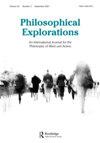Why difference-making mental causation does not save free will
IF 1.1
3区 哲学
0 PHILOSOPHY
引用次数: 0
Abstract
ABSTRACT Many philosophers take mental causation to be required for free will. But it has also been argued that the most popular view of the nature of mental states, i.e. non-reductive physicalism, excludes the existence of mental causation, due to what is known as the ‘exclusion argument’. In this paper, I discuss the difference-making account of mental causation proposed by [List, C., and Menzies, P. 2017. “My Brain Made Me Do It: The Exclusion Argument Against Free Will, and What’s Wrong with It.” In H. Beebee, C. Hitchcock, & H. Price (eds.), Making a Difference: Essays on the Philosophy of Causation. Oxford Scholarship Online: Oxford University Press], who argue that their account not only solves the problem of causal exclusion but also saves free will. More precisely, they argue that it rebuts what they call ‘the Neurosceptical Argument’, the argument that if actions are caused by neural states and processes unavailable to us, there is no free will. I argue that their argument fails for two independent reasons. The first reason is that they fail to show that difference-makers are independent causes. The second reason is that physical realizers of mental states can be individuated in a way that makes both mental states and their realizers difference-makers.为什么造成差异的心理因果关系不能拯救自由意志
许多哲学家认为精神因果关系是自由意志所必需的。但也有人认为,对精神状态本质最流行的观点,即非还原物理主义,由于所谓的“排除论”,排除了精神因果关系的存在。在本文中,我讨论了[List,C.和Menzies,P.2017提出的精神因果关系的差异解释。“我的大脑让我这么做:反对自由意志的排斥论,以及它的错在哪里”,载于H.Beebee、C.Hitchcock和H.Price(编辑),《有所作为:因果哲学随笔》。牛津奖学金在线:牛津大学出版社],他们认为他们的账户不仅解决了因果排斥的问题,而且节省了自由意志。更准确地说,他们认为这反驳了他们所说的“神经怀疑论”,即如果行为是由我们无法获得的神经状态和过程引起的,就没有自由意志。我认为他们的论点失败有两个独立的原因。第一个原因是他们没有证明差异制造者是独立的原因。第二个原因是,心理状态的物理现实者可以以一种使心理状态和现实者都不同的方式进行个性化。
本文章由计算机程序翻译,如有差异,请以英文原文为准。
求助全文
约1分钟内获得全文
求助全文

 求助内容:
求助内容: 应助结果提醒方式:
应助结果提醒方式:


